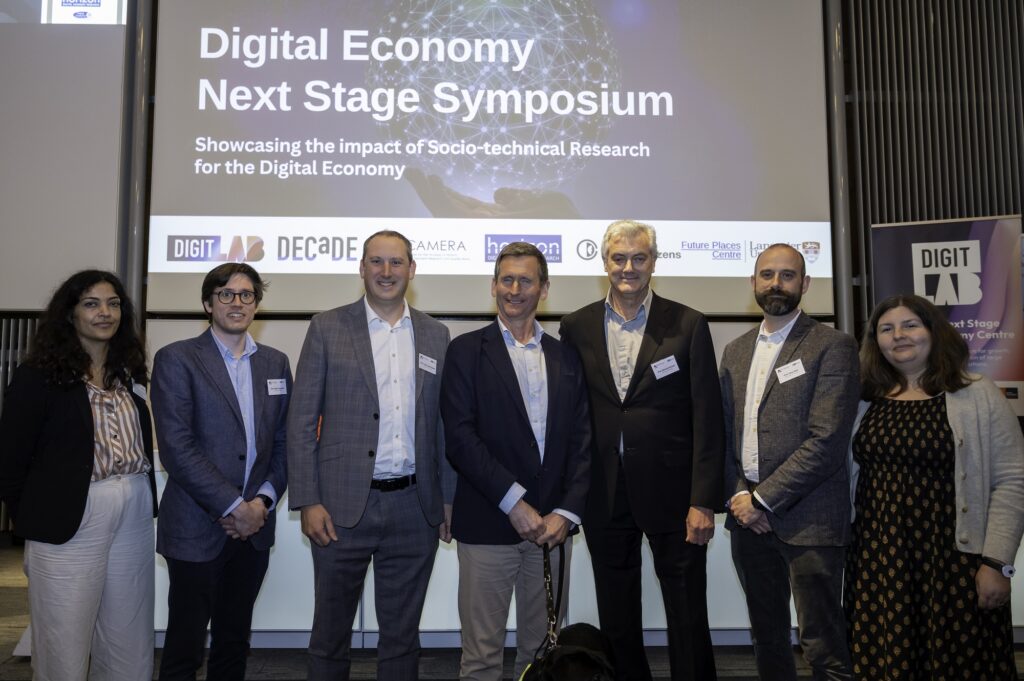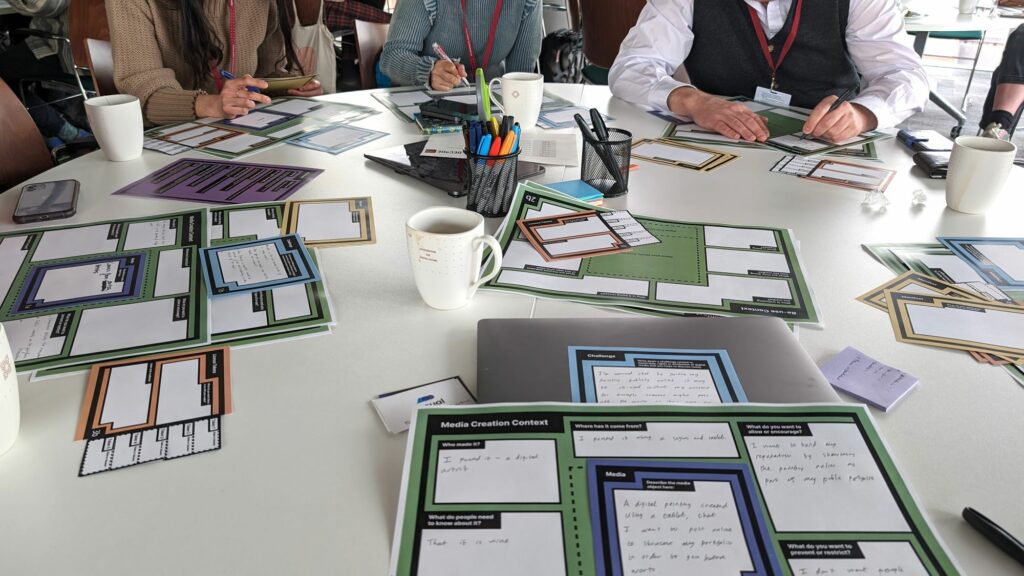NEWS AND EVENTS
Digital Economy Next Stage Symposium – 10th June 2024
Hear from DECaDE Director Professor John Collomosse who presented at The Digital Economy Next Stage Symposium.
The event showcased outputs and impacts of socio-technical research in the UK from six Next Stage DE centres including DECaDE; who have been looking at ways to harness digital technologies for our economy, our communities, our cultural lives, and our health and wellbeing.

Professor elected for prestigious fellowship
6th August 2024

Harnessing the future of the digital economy
17th June 2024

Investigating digital licensing technologies – creative workshop
1st February 2024
JUNE 8,2022
DECaDE Webinar
DECaDE is organising a webinar on Web3.0 : Decentralization of data that brings economical benefit to the data originators. Follow the link here to know more about the event and register.
JUNE 30, 2022
Best Paper Award

Dr Ashley Fraser, from Department of Computer Science, Surrey and a researcher at DECaDE wins the best paper award at CADE 2022 conference. The conference was held at Venice in early June. Dr Ashley presented her work on the role of block chain for self sovereign identity.
JUNE 20, 2022
CADE 2022 Conference, Venice

Dr Birgit Altrichter presenting work on creative media content trading at CADE conference 2022 held at Venice. Her work is related to DECaDE project dedicated to create a content trading platform for digital media. You can get to know more about her work in this video, where she discusses the challenges and the issues related to digital content trading.

Dr Ashley Fraser, presenting a paper on ‘On the role of blockchain for self-sovereign identity’. Self-sovereign identity (SSI) is a model for digital identity in which users control their identity. Users are issued with credentials and can use such credentials to construct verifiable proofs of identity to a third party. Typically, blockchain technologies are leveraged to implement a verifiable data registry, which is a constituent part of the SSI architecture. It is often suggested that blockchain enables the decentralised and trusted ecosystem required for an SSI system. In her research, she evaluates whether blockchain can provide the necessary decentralisation and trust. The argument presented was, blockchain has the potential to enable this ecosystem, but this is dependent on the type of blockchain used to implement an SSI system. Moreover, with respect to trust, her work argues that blockchain alone is not sufficient and must be accompanied with other mechanisms to provide a trusted ecosystem for SSI systems.
JUNE 13, 2022
A short talk by Professor Glenn Parry on Technology and Future of Work

The University of Surrey’s new Future of Work Research Centre was launched on 26th May 2022. The new Research Centre will focus on the nature and organization of work including job quality, employment conditions and well-being consequent upon rapid technological advancements, economic developments, and societal value changes.
Professor Glenn Parry (Head of the Department of Digital Economy, Entrepreneurship and Innovation) provided a historical overview of the impact of technologies on work and employment . Listen to the talk here.
MARCH 10,2022

Since Brexit, logistics firms have faced addition friction at UK Borders. There have been calls for automated digital borders, but few such systems exist. A new paper by DECADE researchers draws on the Reducing Friction in International Trade (RFIT) project. RFIT developed a supply chain platform that integrates with UK Border agencies and uses blockchain to secure a common data set, reducing errors, improving data visibility and helping build trust.
The case example of the import of wine from Australia was used to study the technological characteristics of blockchain and how inbuilt data transparency and integrity affect trust and trustworthiness. Trust is imperative in any business dealings. Current academic literature on the role of trust in supply chains examines simple, linear supply chains. However, there is limited use of trust building frameworks to study relationships within the complex multiparty supply chains that are typical of today’s global supply chains.
Research finds that the RFIT blockchain platform improved the process of trust formation and maintenance in relationships between participants of the wine supply chain. The end-to-end visibility of immutable data helped create a trust ecosystem, broadening trust relationships beyond the business-to-business dyad. However, technology does not change the requirement for trust between supply partners or the trust-based policy of the UK Government at the customs border. Read the full article here.
EXHIBITION | A TOKEN GESTURE
MARCH 03,2022

A Token Gesture is an academic research project and an exhibition led by researchers at the Institute for Design Informatics, part of the UKRI funded DECaDE: Centre for a Decentralised Digital Economy. Through this, we plan to introduce, explore and critique new public interactions and ownership of digital art via ‘non-fungible tokens’ – more commonly known as NFTs.
In this project, members of the public in Edinburgh will be able to:
- Generate unique pieces of digital art through a street-level, walk-up interaction
- Register their artwork for display in the exhibition via the InSpace City Screen
- Mint, claim and own a non-transferable NFT, representing their piece of art, that will allow them to control how their piece is displayed
Two Scottish based generative artists Sasha Belitskaja and Cameron “Gingey” have worked with our researchers to create a system where anyone can generate a unique piece of digital art simply by presenting a colour to a fixed camera.
Participants are then carefully guided through setting up a crypto wallet to claim and mint an NFT representing their piece. This NFT – a unique, digital token – cannot be transferred, or exchanged. However, it serves to register the artwork, evidence an individual’s contribution, and will allow them to control when the artwork is displayed on the City Screen projectors.
For more information on this, please visit https://inspace.ed.ac.uk/
MEDIA PROVENANCE WORK BY DECaDE
FEBRUARY 22, 2022
Digital image manipulation has contributed enormously the way fake news is being spread online in recent times. Images and videos are usually subjected to one or several transformations during redistribution on the Internet. These transformations could lead to the spread of misinformation and could totally change the story told by the original image/video. In the video, we show how AI could be used to link a transformed visual content back to its original source. Watch the video here.
PRIVACY PRESERVING IMAGE PROVENANCE PROJECT BY DECaDE
FEBRUARY 22, 2022
This project describes how we are using self-sovereign identity technologies to allow photojournalists to distribute and assert ownership of images in a privacy-preserving way. In the video we outline our work so far and provide details of future work on this project. Watch video here.
DECaDE BROCHURE
SEPTEMBER 30, 2021

We are happy to launch DECaDE innovation brochure 2021. DECaDE was launched in October 2020 and is a 5-year National Research Centre exploring how emerging data technologies such as Distributed Ledger Technology (aka `Blockchain’) and Artificial Intelligence (AI) could transform our digital economy through decentralised platforms. DECaDE is co-creating exciting research projects with industries and public sector end users in the field of decentralised digital economy, with particular focus on creative economy as well as focused on capability building by co-funding PhD studentships and research fellows. DECaDE Autumn edition brochure focuses on our mission, vision, and our industry engagement strategy. We are currently engaged in 4 thematic projects which are Decentralised Registry for Content Attribution, Decentralised Trading Floor for Content Attribution and Rights, Future of Work and Content Production, and Identity in the Decentralised Digital Economy as well as one agile project Decentralisation in Supply Chain Management. The brochure outlines our activities on all current projects and research and publication outputs. Read the web version of the brochure or download it here. For more information or to partner with us Get In Touch.
LAUNCH OF THE CENTRE FOR THE DECENTRALISED DIGITAL ECONOMY (DECADE)
OCTOBER 1, 2020
The University of Surrey, together with the University of Edinburgh and Digital Catapult, has today launched the Digital Economy Centre for the Decentralised Digital Economy (DECaDE), thanks to £4million awarded by the Engineering and Physical Sciences Research Council and £6million investment from industrial partners.
In a short space of time, we have seen our economy transformed by digital technology, offering everyone the opportunity to be a producer, seller and direct consumer of services. But these dynamic, peer to peer markets are all underpinned by centralised digital platforms. Users rarely have a say in their governance decisions, which often made isolation of the global impacts they have on society.
DECaDE asks what can we do to transform this emerging future economy into one that is fair, that has appropriate governance, and maximises opportunites for everyone to create value. How can decentralised platforms enabled by emerging data-centric technologies like Artificial Intelligence, Distributed Ledgers and Blockchain transform our future economy – and the way we work, interact and create value.
DECaDE is part of a programme of Next Stage Digital Economy Centres that will take forward previously funded inter and multidisciplinary applied digital economy research to “the next stage”, ultimately easing the pathway to better commercialisation. Across all five funded centres, the EPSRC contribution of £22 million has leveraged more than £29.5 million of partner contributions from industry and the universities involved.
